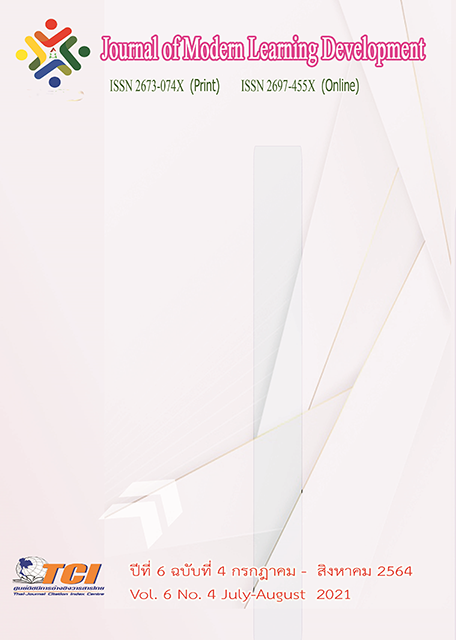A Buddhist Method for Developing Emotional Quotient
Main Article Content
Abstract
Buddhism greatly emphasizes on the importance to emotional quotient causing the cognitive intelligence. In other words, good emotion leads to wisdom, creative consciousness and happiness. Emotional quotient is a unique skill that can be created and developed by oneself. The way to develop the emotional quotient based on the principles of mindfulness is the method of life development, emphasizing on co-working of the two elements: emotion and wisdom. The practice of the mindfulness consists of diligence and mindfulness as the emotional component (EQ), and consciousness as the wisdom component (IQ). The third component correlatively functions in emotional contemplation in body, feelings, mind and Dhamma. The mindfulness practice can be performed anytime in daily life through observing the actions: standing, walking, lying and sleeping and so on. The main principle of mindfulness practice is being mindful in all actions without any imagination, thought and critique; to realize the tangible and intangible Dhamma as they are; being unattractive to self; to have a clear vision on a condition called liberation; to control the mind in the new form of purity and freedom.
Emotional quotient will promote success in work and family, personal and social life. It creates self-understanding, feelings of oneself and others, realization of strength and weaknesses of oneself and management of appropriate emotional expression.
Article Details
References
กรมสุขภาพจิต. (2550). อีคิว : ความฉลาดทางอารมณ์ (ฉบับปรับปรุง). (พิมพ์ครั้งที่ 4). นนทบุรี: สำนักพัฒนาสุขภาพจิต.
เทิดศักดิ์ เดชคง. (2547). ความฉลาดทางอารมณ์จากทฤษฎีสู่ปฏิบัติ. กรุงเทพมหานคร: Desktop
เทิดศักดิ์ เดชคง. (2541). มองอเมริกา มาแก้ปัญหาไทย. กรุงเทพมหานคร: มูลนิธิพุทธธรรม.
เทิดศักดิ์ เดชคง. (2541). การศึกษาเครื่องมือพัฒนาที่ยังต้องพัฒนา. (พิมพ์ครั้งที่ 2). กรุงเทพมหานคร: มูลนิธิพุทธธรรม
เทิดศักดิ์ เดชคง. (2546). พุทธธรรม. (พิมพ์ครั้งที่ 11). กรุงเทพมหานคร: โรงพิมพ์มหาจุฬาลงกรณราชวิทยาลัย.
มหาจุฬาลงกรณราชวิทยาลัย. (2539). พระไตรปิฎกภาษาไทยฉบับมหาจุฬาลงกรณราชวิทยาลัย. กรุงเทพมหานคร: มหาจุฬาลงกรณราชวิทยาลัย
ราชบัณฑิตยสถาน. (2525). พจนานุกรมฉบับราชบัณฑิตยสถาน. กรุงเทพมหานคร: อักษรเจริญทัศน์
วีระวัฒน์ ปันนิตามัย. (2542). เชาวน์อารมณ์ EQ : ดัชนีวัดความสุข และความสำเร็จของชีวิต.กรุงเทพมหานคร: เอ็กซเปอรเนทจำกัด
อุสา สุทธิสาคร. (2544). พัฒนาอีคิวเด็กอย่างไร. (พิมพ์ครั้งที่ 3). กรุงเทพมหานคร: แปลนพับลิชชิ่ง
Cooper.R.K.&Sawaf.A. (1997). Executive EQ: Emotional Intelligence in leadership and organization. New York: Basic books,
Goleman D. (1998). Emotional Intelligence : why it can matter than IQ. New York: Basic books.


